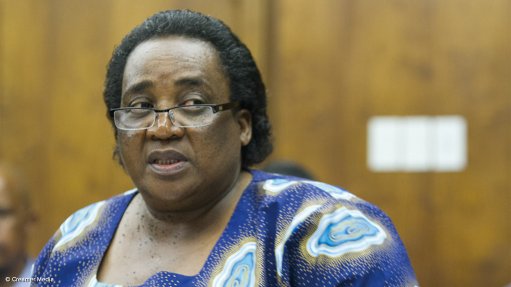
Minister Mildred Oliphant
Labour Minister Mildred Oliphant has extended the Bargaining Council for the Civil Engineering Industry’s (BCCEI’s) dispute resolution centre collective agreement to nonparties, allowing them the same advantages as those companies that are party to the bargaining council.
Pending its application for accreditation by the Commission for Conciliation, Mediation and Arbitration (CCMA), the BCCEI was directing all nonparty disputes to private and independent dispute resolution body Tokiso Dispute Settlement – a CCMA-accredited agency.
“An important differentiator that BCCEI brings is access to a panel of skilled professional commissioners with industry specific experience. The Tokiso commissioners are CCMA accredited, have an in-depth understanding of the civil engineering sector and will hear cases under industry specific standards and guidelines,” BCCEI senior case management officer Merle Denson said in a statement.
All cases would also now be referred to BCCEI’s head office in Bedfordview, where the majority of cases in the greater PWV megalopolis – comprising Pretoria, Greater Johannesburg (Witwatersrand) and Vaal Triangle (Vereeniging) – would be heard.
Further, the venue would also be used by Tokiso for hearing the nonparty disputes to ensure a seamless service offering to the industry.
The new Johannesburg premises featured custom-built hearing rooms with equipment for recording all arbitrations. “Copies of these recordings will be available to parties at a nominal cost,” Denson said.
For cases in other regions, a CCMA-accredited commissioner would be appointed to facilitate the process within that specific region.
The BCCEI was determined to facilitate ease of access to information and all the Labour Relations Act statutory forms. The council’s rules were available on its website for access when referring a dispute.
Denson said all outcomes and awards would be screened to ensure quality, “but in a manner that ensures that the discretion of the commissioner is not interfered with. It is important to understand that all arbitration awards will be final and binding”.
Large long-term multidisciplinary projects, where site agreements were applied and where party and nonparty disputes arose would be heard on site.
Denson noted that this legally compliant process would result in significant time and cost savings for all parties.
Employers could also now refer an inquiry by arbitrator to the BCCEI, which allowed the employer to bring a final and binding arbitration to the disciplinary hearing stage, streamlining all the steps of the dispute resolution process into one, saving time and money.
It also granted certainty to both parties in a shorter time.
Meanwhile, the BCCEI said the Building, Construction and Allied Workers Union, the National Union of Mineworkers and South African Forum of Civil Engineering Contractors, had agreed to continue wage negotiations on July 16.
This followed the deadlock reached in talks in June.